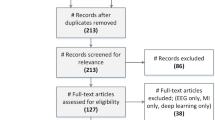Abstract
Brain activities recorded while performing mental imagination of body motor parts are called motor imagery signals. In the field of Brain Computer Interface (BCI), it has been observed that motor imagery classification model trained for one person doesn’t fit well for others. And the reason for this being, Electroencephalogram (EEG) measurements recorded while performing motor imagery are different for every other person as everyone has slightly different foldings of cortex, functional map etc. To solve this problem, many researchers have proposed various conventional, and deep learning based classification models. To our knowledge, most of the works in this field train different models for different individuals. But it is not practical to train a model from scratch for every individual who will be using a real world BCI application. We propose a meta-learning based approach for motor imagery signal classification where a model is trained on a variety of learning tasks, such that it is capable of learning new tasks using only a small number of training samples. Thus only one model is required to be trained for all the subjects. We have conducted our experiments on the BCI competition IV-2b dataset consisting of 9 subjects performing left hand and right hand motor imagery task. The results signifies that subject specific calibration is a much better and optimal approach as compaired to subject specific training as the fine tuned meta learnt model outperforms subject specific trained models (Source code avaliable at https://github.com/RahulnKumar/EEG-Meta-Learning.).
Access this chapter
Tax calculation will be finalised at checkout
Purchases are for personal use only
Similar content being viewed by others
References
Wolpaw, J., Wolpaw, E.W.: Brain-computer interfaces: principles and practice. OUP USA (2012)
Vallabhaneni, A., Wang, T., He, B.: Brain-computer interface. Neural Eng., 85–121 (2005)
Lu, N., Li, T., Ren, X., Miao, H.: A deep learning scheme for motor imagery classification based on restricted boltzmann machines. IEEE Trans. Neural Syst. Rehabil. Eng. 25(6), 566–576 (2016)
Oureshi, S., Dias, G., Saha, S., Hasanuzzaman, M.: Gender-aware estimation of depression severity level in a multimodal setting. In: 2021 International Joint Conference On Neural Networks (IJCNN), pp. 1–8 (2021)
Qureshi, S., Dias, G., Hasanuzzaman, M., Saha, S.: Improving depression level estimation by concurrently learning emotion intensity. IEEE Comput. Intell. Mag. 15, 47–59 (2020)
Qureshi, S., Saha, S., Hasanuzzaman, M., Dias, G.: Multitask representation learning for multimodal estimation of depression level. IEEE Intell. Syst. 34, 45–52 (2019)
An, X., Kuang, D., Guo, X., Zhao, Y., He, L.: A deep learning method for classification of EEG data based on motor imagery. In: International Conference On Intelligent Computing, pp. 203–210 (2014)
Tabar, Y.R., Halici, U.: A novel deep learning approach for classification of eeg motor imagery signals. J. Neural Eng. 14(1), 016003 (2016)
Wang, P., Jiang, A., Liu, X., Shang, J., Zhang, L.: LSTM-based EEG classification in motor imagery tasks. IEEE Trans. Neural Syst. Rehabil. Eng. 26(11), 2086–2095 (2018)
Kumar, R., Saha, S.: A multi-task learning scheme for motor imagery signal classification. In: International Conference On Neural Information Processing, pp. 311–322 (2021)
Li, D., Ortega, P., Wei, X., Faisal, A.: Model-agnostic meta-learning for EEG motor imagery decoding in brain-computer-interfacing. In: 2021 10th International IEEE/EMBS Conference On Neural Engineering (NER), pp. 527–530 (2021)
Ang, K., Chin, Z., Zhang, H., Guan, C.: Filter bank common spatial pattern (FBCSP) in brain-computer interface. In: 2008 IEEE International Joint Conference On Neural Networks (IEEE World Congress On Computational Intelligence), pp. 2390–2397 (2008)
Ko, W., Yoon, J., Kang, E., Jun, E., Choi, J., Suk, H.: Deep recurrent spatio-temporal neural network for motor imagery based BCI. In: 2018 6th International Conference on Brain-Computer Interface (BCI), pp. 1–3 (2018)
Andrychowicz, M., et al.: Learning to learn by gradient descent by gradient descent. In: Advances in Neural Information Processing Systems, pp. 3981–3989 (2016)
Ravi, S., Larochelle, H.: Optimization as a model for few-shot learning (2016)
Finn, C., Abbeel, P., Levine, S.: Model-agnostic meta-learning for fast adaptation of deep networks. In: International Conference on Machine Learning, pp. 1126–1135 (2017)
Lake, B., Salakhutdinov, R., Gross, J., Tenenbaum, J.: One shot learning of simple visual concepts. In: Proceedings of the Annual Meeting of the Cognitive Science Society, vol. 33 (2011)
Leeb, R., Brunner, C., Müller-Putz, G., Schlögl, A., Pfurtscheller, G.: Bci competition 2008-graz data set b, pp. 1–6. Graz University of Technology, Austria (2008)
Ang, K.K., Chin, Z.Y., Wang, C., Guan, C., Zhang, H.: Filter bank common spatial pattern algorithm on BCI competition iv datasets 2a and 2b. Front. Neurosci. 6, 39 (2012)
Acknowledgments
Dr. Sriparna Saha gratefully acknowledges the Young Faculty Research Fellowship (YFRF) Award, supported by Visvesvaraya Ph.D. Scheme for Electronics and IT, Ministry of Electronics and Information Technology (MeitY), Government of India, being implemented by Digital India Corporation (formerly Media Lab Asia) for carrying out this research.
Author information
Authors and Affiliations
Corresponding author
Editor information
Editors and Affiliations
Rights and permissions
Copyright information
© 2023 The Author(s), under exclusive license to Springer Nature Singapore Pte Ltd.
About this paper
Cite this paper
Kumar, R., Saha, S. (2023). Decoding Brain Signals with Meta-learning. In: Tanveer, M., Agarwal, S., Ozawa, S., Ekbal, A., Jatowt, A. (eds) Neural Information Processing. ICONIP 2022. Communications in Computer and Information Science, vol 1792. Springer, Singapore. https://doi.org/10.1007/978-981-99-1642-9_26
Download citation
DOI: https://doi.org/10.1007/978-981-99-1642-9_26
Published:
Publisher Name: Springer, Singapore
Print ISBN: 978-981-99-1641-2
Online ISBN: 978-981-99-1642-9
eBook Packages: Computer ScienceComputer Science (R0)





